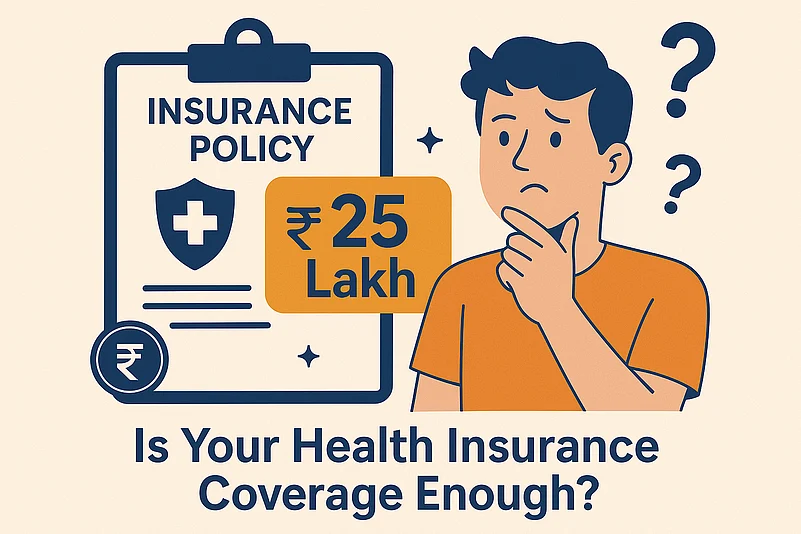A Rs 25 lakh health insurance cover may sound substantial on paper today, but is it really enough to cushion you against hefty hospital bills and growing medical inflation? Today, especially in a post-Covid era with persistent medical inflation, this figure may be more illusion than assurance. This is even more crucial when you are considering health coverage for your family.
Let’s start with a basic but often misunderstood fact: that the Rs 25 lakh floater plan you bought for your family of four is not Rs 25 lakh per person. It is a shared limit. One major illness in a single member can wipe out the entire cover, leaving the rest of the family exposed.
In a post on social media platform X (formerly Twitter), CA Nitin Kaushik, who specialises in insurance and tax planning, stated, “Just an ICU stay with a surgery in a major city can cost anywhere between Rs 5 to 10 lakh.”
And he is not entirely. A recent story done by Outlook Money recently noted how surgery costs of some key and critical treatments have already more than doubled in the past decade.
For instance, when it comes to something more critical, for example, cancer or an organ transplant, the costs can easily cross Rs 30 to 50 lakh. And that’s not even considering follow-up treatment and recovery.
It’s a warning that hits hard when you realise how underinsured most people actually are, according to Policybazaar’s How India Buys Insurance 2.0 report, 75 per cent of health insurance buyers in India have policies with a sum insured of Rs 10 lakh or less. Almost half (48 per cent ) operate on a cover of just Rs 5 lakh, a figure that barely scratches the surface of today’s treatment costs for serious illnesses.
The gap is worse in smaller towns. In tier 2 and 3 cities, 60 per cent of buyers have Rs 5 lakh or less in coverage. Many of these patients end up travelling to metro hospitals for better care, which adds costs for travel, lodging, and co-payments, none of which your policy might fully account for.
Medical inflation in India has been running high, between 10 to 14 per cent annually. And the spike is across the board. A single chemotherapy cycle now costs around Rs 1 lakh. Multiply that by six to eight sessions, throw in surgery and radiation, and you are easily looking at Rs 20 lakh.
A kidney transplant? Roughly Rs 6.5 lakh.
Liver transplant? Upwards of Rs 20 lakh.
Dialysis and follow-up care? Another few lakhs a year.
So, is Rs 25 lakh enough? In a word, no.
Kaushik suggests a more layered and realistic approach to health coverage. “Start with an individual base cover of at least Rs 10–15 lakh,” he advises. “Then add a super top-up policy, these usually kick in after a deductible limit and can go up to Rs 90 lakh.”
A family might be able to secure one for as little as Rs 700 to Rs 1,000 per month, he notes.
Yet, most people wait for a medical emergency before realising their cover is too thin. At that point, the options shrink dramatically. “People invest in SIPs and mutual funds for years, but one hospital bill can undo that entire effort,” Kaushik points out.
The kind of policy you choose, its fine print, the waiting periods, and the network of hospitals, all play a huge role. Policies that lure buyers with low premiums often come with hidden co-payments, restrictive room rent limits, or sub-limits on specific procedures. These limitations can leave you paying out-of-pocket when you can least afford it.
There’s also the age factor. In floater policies, premiums are pegged to the age of the eldest family member. Some plans even limit entry to 60 years. So if you are planning to include ageing parents, choose wisely.
What should policyholders do? It is typically advised to review your health insurance every few years, particularly after life milestones such as marriage or childbirth.
With rising lifestyle diseases and an ageing population, it is no longer enough to just have insurance. You need to have adequate insurance. Rs 25 lakh might have looked like a safe number five years ago. Today, it might barely buy peace of mind for a few months.












